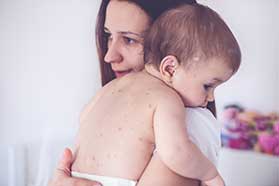Chicken Pox Treatment in Sherman Oaks, CA

The chicken pox is a very common infection caused by the varicella-zoster virus which results in an itchy rash and later fluid-filled blisters and scabs. These symptoms usually present themselves on the face, chest and back and then spread to the rest of the body.
Most frequently affecting children under the age of 15 (though older children and adults can also be affected) the chicken pox is highly contagious, spreading easily between persons who have not yet had the disease or been vaccinated for it. For babies, older adults and those with weakened immune systems, the infection can quickly become dangerous if ignored.
The chicken pox poses a risk to more than children as a highly contagious and infectious disease, but how do you get chicken pox specifically? The virus manifests when you come into contact with the varicella-zoster virus, and it spreads quickly through either direct contact with the rash or by droplets dispersed in the air by coughing or sneezing. Chicken pox presents a risk to:
- Those who haven’t had chicken pox in the past
- Those who haven’t been vaccinated for chicken pox
- Those who work in or attend a school or childcare facility
- Those who live with children
To schedule a consultation with a qualified healthcare provider in Sherman Oaks that can administer chicken pox treatment, call (424) 365-1800 or contact Dr. Jeremy Fischer online.
What is Getting the Chicken Pox Like?
For those who have never had the chicken pox, the idea of contracting the virus can be frightening because of the symptoms associated with the infection. The most frequently reported chicken pox symptoms include a fever, headaches, fatigue and loss of appetite, all of which may worsen if not treated.
When infected with the chicken pox, red bumps called papules will begin to form within several days of infection. Small fluid-filled blisters (vesicles) form out of these raised bumps, which break and leak. Crusts and scabs, covering the broken blisters, take several days to heal. New bumps typically follow, causing a rash. It generally only takes up to 48 hours of infection before the virus becomes contagious, and you typically will remain contagious until all the spots crust over.
Typically, the chicken pox will take between 7 and 21 days (most commonly 10-14 days) to run its course.
Chicken Pox Complications
While the condition may be mild in general, it can progress and create complications if not properly addressed. Complications of the chicken pox could include:
- Dehydration
- Pneumonia
- Inflammation of the brain (encephalitis)
- Bacterial infections of the skin, soft tissue, bones, joints or bloodstream (sepsis)
- Toxic shock syndrome
- Reye’s syndrome for those taking aspirin during chicken pox
- Risk to pregnancy: Pregnant women developing chicken pox face a higher risk as the condition can spread to the fetus, resulting in a variety of problems in the newborn including low birth weight and birth defects such as limb abnormalities or even death if the mother is infected weeks leading up to birth.
Chicken Pox Treatment
Chicken pox treatment typically aims to reduce symptoms caused by the virus, easing the feeling of uncomfortableness associated with the illness, while the immune system responds to the virus. Some of these may include:
- Soothing creams such as an emollient, oatmeal baths and cold compresses to diminish the itchiness.
- A sedating antihistamine (either a tablet or liquid medicine) to help with sleep if the itchiness is so severe that it becomes an issue.
- Prescription medication such as an antiviral or over-the-counter medicine to counteract a fever.
When administered early on, chicken pox treatment can help to prevent serious complications. In all chicken pox cases, it is important to consult your healthcare provider and to stay in contact with them if further complications arise, such as a prolonged fever or difficulty breathing.
Chicken Pox Vaccine
Some believe that the best way to approach the chicken pox is to build up an immunity to it, exposing themselves or their children to infected individuals in what has become known colloquially as "pox parties." However, this is generally not recommended as severe complications of chicken pox can be deadly; prevention is more typically recommended and the chicken pox vaccine can be administered by a healthcare provider to protect you against the virus.
The vaccine is typically administered when children are between the ages of 12 and 15 months old. A booster shot given when they are between the ages of 4 and 6 years old will further protect them against the virus. While the vaccine will lower your child's risk of developing the chicken pox, the virus may still affect your child even with the vaccine, though it will be far milder than if not vaccinated. For adults who weren't vaccinated as children, two doses of the chicken pox vaccine will help protect them from a potential breakout.
Chicken Pox and Shingles
Once you've had chicken pox--that is, once you've been infected by the varicella-zoster virus--you become at risk for developing a condition in later life known as shingles. Trace amounts of the varicella-zoster virus remain in your nerve cells and may become reactivated as shingles. It is therefore important to get vaccinated for the chicken pox to avoid infection.
A qualified healthcare provider in Sherman Oaks that can administer the chicken pox vaccine and discuss risks of the virus with you. Call (424) 365-1800 or contact Dr. Jeremy Fischer online.
Vitality Integrative Medicine
Address
4849 Van Nuys BlvdSuite 104
Sherman Oaks, CA 91403
(424) 365-1800
www.vitalityintegrative.com
Hours
Mon:
8:00 am - 6:00 pm
Tue:
8:00 am - 6:00 pm
Wed:
8:00 am - 6:00 pm
Thu:
8:00 am - 6:00 pm
Fri:
8:00 am - 6:00 pm
Sat:
8:00 am - 12:00 pm

